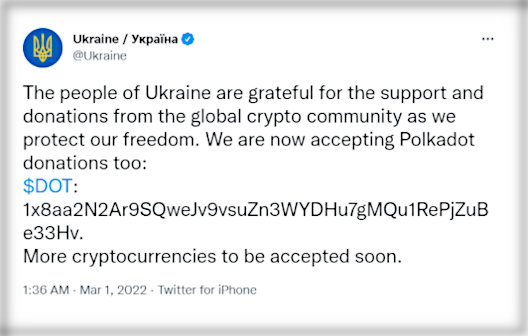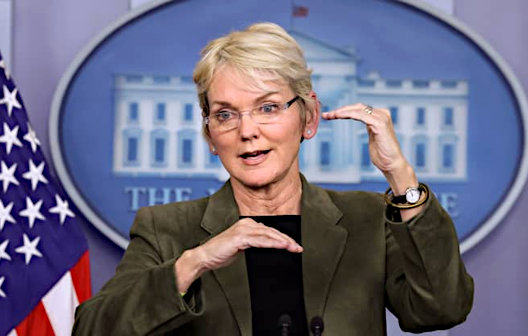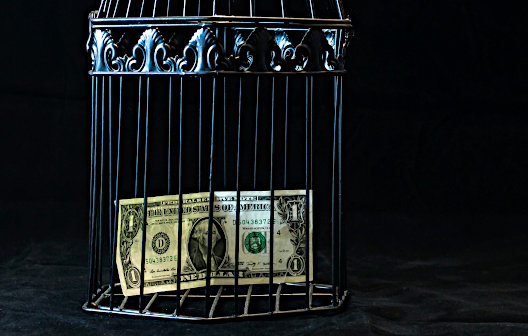Image Credit: Dmitry Shustov (Flickr)
The Conundrum Crypto-Exchanges Face – What is Their Wartime Responsibility?
The ethical question crypto exchanges are faced with as it relates to an aggressive nation versus maintaining a stateless bitcoin or other cryptocurrency creates a predicament with no satisfying answers. Exchanges are faced with allowing as regular transactions those that potentially help fund military aggression while undermining financial sanctions, or halting these transactions, which may in part undermine their own existence. The exchanges have unapologetically pushed back on requests from both U.S. officials and Ukraine leaders. While adhering to the requests may appear the most moral avenue, these same actions would undermine trust, which is the strength of any currency – so restricting transactions could undermine cryptocurrencies’ usefulness for everyone. One-by-one the crypto exchanges have been solidifying or creating their policies as it relates to their overall obligation.
Position of the Exchanges
In an interview this week, Bloomberg spoke with Jean-Marie Mognetti, the CEO of CoinShares. Mr. Mognetti quoted Winston Churchill saying, “Where there is great power, there is great responsibility.” Mognetti thinks the marketplace and exchanges have good leaders and can develop responsible protocols. When the Bloomberg interviewer asked how an exchange can square the idea that at its philosophical core, cryptocurrency is designed to be stateless and without favoritism, the Coinshares CEO offered, “It’s a conundrum because there is, what crypto is supposed to be, at its core, and how it’s supposed to work. I think sometimes there are events that require different things.” Mognetti then added, “if government asks for freezing assets or doing something like this, most crypto platforms would abide by it, and stand by it.” It seems that, although Mognetti doesn’t feel as though the company should take a position, a regulated environment, perhaps even a self-regulated exchange environment, is not something exchanges would be completely against.
After Ukraine’s Vice Prime Minister Mykhailo Fedorov publicly pleaded for all major crypto exchanges to freeze related accounts to further challenge Russia’s resources and undermine the war, the CEO of widely used Kraken, Jesse Powell, responded to the call. The Kraken co-founder used Twitter to make clear, that while he has “deep respect” for the people of Ukraine, he believes crypto should enforce individualism, rather than a nationalistic alliance to a country.
Among the key points Binance founder and CEO Changpeng Zhao, told the BBC related to freezing Russian accounts is, “Many normal Russians do not agree with war…We [Binance] differentiate between the Russian politicians who start wars and the normal people…We don’t control the industry.” To demonstrate his company’s official neutrality, Zhao said, “I can publish my sanction list, you can publish yours… Guess what? No-one else is going to follow. It just moves Russian users to other smaller platforms.”
Coinbase, another large crypto U.S.-based exchange, responded to the plea from Ukraine by saying it, “will not institute a blanket ban on all Coinbase transactions involving Russian addresses.” A company spokesman explained their position. “A unilateral and total ban would punish ordinary Russian citizens who are enduring historic currency destabilization as a result of their government’s aggression against a democratic neighbor,” a spokesman for Coinbase said.
Position of the U.S. Treasury
The U.S. is forbidding U.S. citizens from employing cryptocurrencies as a work-around to undermine global financial sanctions placed on Russia. The primary goal of the sanctions is to cause the country to come to a financial standstill and tear at the support of some of the wealthiest Russians that may have used bitcoin and other cryptocurrencies as a safe haven asset leading up to the Russian invasion.
Washington’s newest severe financial measures, include prohibiting transactions with Russia’s central bank and restricting access to the SWIFT global payments system.
The U.S. has also urged global cryptocurrency exchanges to block sanctioned individuals from accessing their digital assets regardless of location. The “ask” stops short of requiring this action.
Take-Away
Should crypto exchanges have within their power to do what many would consider “good”, or should they remain stateless and retain their neutrality promise to customers? Neutrality shows they can always be counted on to act one way, anything else may undermine their value and the value of the assets that are traded on their platforms.
While bitcoin and other cryptos are at their core stateless, and the crypto exchanges are honoring this, if required by a regulatory entity, it appears that they would view it as out of their hands and would abide by a legitimate authority.
Managing Editor, Channelchek
Suggested Reading

Russia/Ukraine War and Reliance on Crypto and Blockchain |

The International Energy Agency Takes Steps to Put a Ceiling on Oil Prices |

Decentralized Finance, Is It The Future? |

Is the Index Bubble Michael Burry Warned About Still Looming? |
Sources
https://www.bbc.com/news/technology-60576373
https://www.bbc.com/news/technology-60576373
Stay up to date. Follow us:
 |

